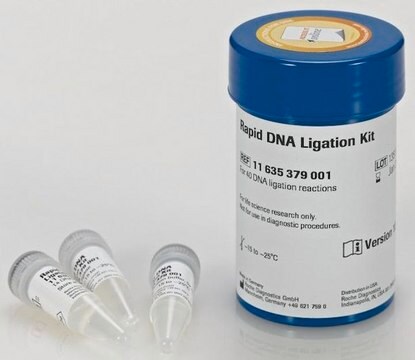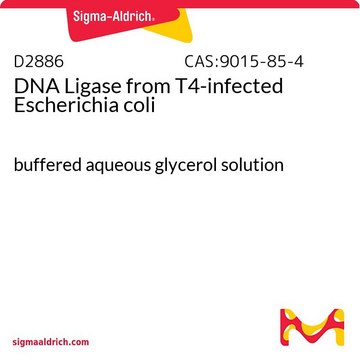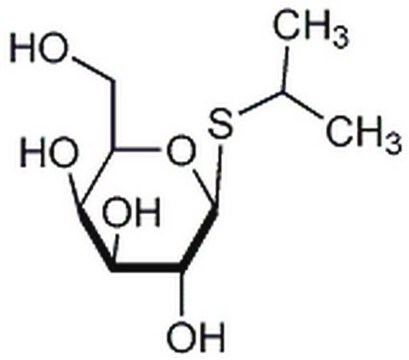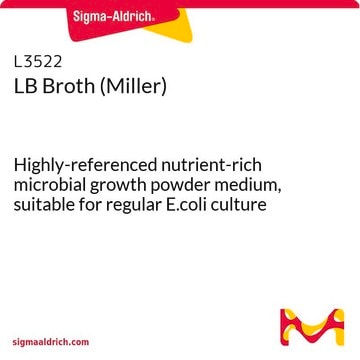推薦產品
生物源
Escherichia coli (NM 989)
品質等級
重組細胞
expressed in E. coli
描述
recombinant form of the enzyme from T4 phage
形狀
solution
比活性
~3000 units/mg protein
包裝
pkg of 100 U (10481220001 [1 U/μl])
pkg of 500 U (10716359001 [1 U/μl])
pkg of 500 U (10799009001 [5 U/μl])
製造商/商標名
Roche
參數
4-22 °C optimum reaction temp.
技術
activity assay: suitable
最適pH
7.2-7.8
儲存溫度
−20°C
一般說明
T4 DNA 连接酶催化双链DNA中邻近的3′-羟基-和5′-磷酸末端之间磷酸二酯键的形成。双链DNA中单链切口也被T4 DNA连接酶封闭。
成分
T4 DNA连接酶,包括含有ATP的10倍浓缩连接缓冲液。
成分
T4 DNA连接酶,包括含有ATP的10倍浓缩连接缓冲液。
特異性
热灭活:可以通过加热使酶失活(65℃,10分钟)。
應用
连接粘性和平端DNA 片段。
品質
质量
根据现行质量控制程序,测试不存在脱氧核糖核酸酶和核酸外切酶。
根据现行质量控制程序,测试不存在脱氧核糖核酸酶和核酸外切酶。
單位定義
一个单位的T4 DNA 连接酶是在+ 37°C下在20分钟内将 1 nmol 32P 从焦磷酸盐转化为诺芮特可吸收材料的酶活性量。一个单位对应于在核酸外切酶III抗性测定中测定的0.2U。稀释缓冲液:50 mM Tris-HCl,10 mM 二硫赤藓糖醇,牛血清白蛋白,500 μg/ml,pH 7.6(+ 25°C)。
体积活性:1 x 103 U/ml; 5 x 103 U/ml
体积活性:1 x 103 U/ml; 5 x 103 U/ml
準備報告
激活剂:Mg2+(10mM),DTT
工作溶液:为了稀释酶,Roche 建议使用含有缓冲液组分的缓冲液:20mM Tris-HCl,60mM KCl,1mM EDTA,5mM 二硫赤藓糖醇,50% 甘油(v/v),pH 7.5(4℃)。
工作溶液:为了稀释酶,Roche 建议使用含有缓冲液组分的缓冲液:20mM Tris-HCl,60mM KCl,1mM EDTA,5mM 二硫赤藓糖醇,50% 甘油(v/v),pH 7.5(4℃)。
其他說明
仅用于生命科学研究。不可用于诊断。
儲存類別代碼
12 - Non Combustible Liquids
水污染物質分類(WGK)
WGK 1
閃點(°F)
does not flash
閃點(°C)
does not flash
分析證明 (COA)
輸入產品批次/批號來搜索 分析證明 (COA)。在產品’s標籤上找到批次和批號,寫有 ‘Lot’或‘Batch’.。
Johanna Viiri et al.
PloS one, 8(7), e69563-e69563 (2013-08-08)
Age-related macular degeneration (AMD) is the most common reason of visual impairment in the elderly in the Western countries. The degeneration of retinal pigment epithelial cells (RPE) causes secondarily adverse effects on neural retina leading to visual loss. The aging
Haoyi Wang et al.
Nature protocols, 3(10), 1569-1577 (2008-09-20)
We present a protocol for a novel method for identifying the targets of DNA-binding proteins in the genome of the yeast Saccharomyces cerevisiae. This is accomplished by engineering a DNA-binding protein so that it leaves behind in the genome a
Anthony Simmons et al.
Nature protocols, 1(6), 2688-2700 (2007-04-05)
Genetic redirection of lymphocytes that have been engineered to recognize antigens other than those originally programmed by their rearranged germlines is a potentially powerful immunotherapeutic tool. The rationale for the protocol described here is that many cancers and persistent or
我們的科學家團隊在所有研究領域都有豐富的經驗,包括生命科學、材料科學、化學合成、色譜、分析等.
聯絡技術服務








